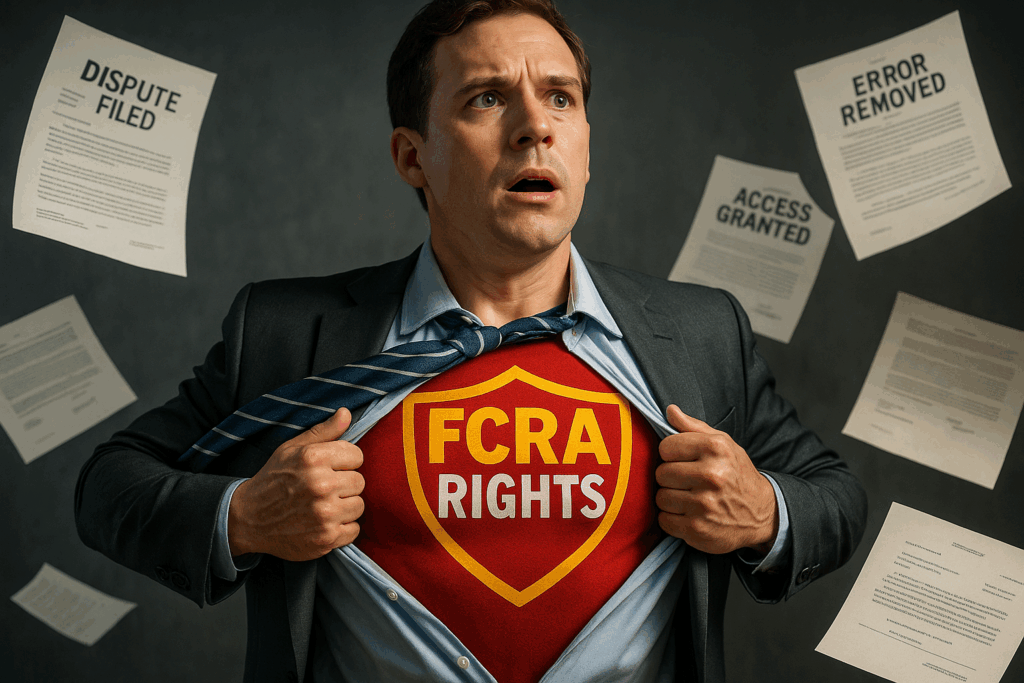The Fair Credit Reporting Act Explained in Plain English

Your credit report can affect nearly every part of your financial life; From buying a car to renting an apartment to getting approved for a mortgage. But here’s something most people don’t realize:
You’re not powerless.
Thanks to a law called the Fair Credit Reporting Act, or FCRA, you have the right to know what’s on your credit report, the right to challenge what’s wrong, and the right to be treated fairly in the process.
If you’d like a basic run down on credit repair, check out Credit Repair 101: What You Need to Know to Get Started.
Now, let’s break it all down (no legal jargon, no fluff) just what you need to know.
What Is the Fair Credit Reporting Act (FCRA)?
The Fair Credit Reporting Act is a federal law passed in 1970. It was designed to protect consumers by regulating how credit information is collected, shared, and used.
In short:
The FCRA gives you the legal right to know what’s being reported about you, dispute incorrect or outdated information, and hold credit bureaus and lenders accountable for errors.
Your Key Rights Under the FCRA (In Plain English)
Here’s what the law gives you the power to do:
1. You Have the Right to See Your Credit Report
You’re allowed to request a free copy of your credit report from each of the three major bureaus (Equifax, Experian, and TransUnion) once every 12 months at AnnualCreditReport.com.
This means you can (and should) check what’s being reported about you without paying a dime.
2. You Have the Right to Dispute Errors
If something on your credit report is inaccurate, incomplete, outdated, or unverifiable, you have the right to dispute it.
Examples:
- Late payments that weren’t actually late
- Accounts that don’t belong to you
- Collections that were already paid or settled
- Duplicate or outdated information
- Identity theft-related accounts
Once you file a dispute, the credit bureau must investigate and respond within 30 days (sometimes 45). If the item can’t be verified, it must be removed. If you want more information, check out How to Dispute Credit Report Information and Correct Errors.
3. Only Certain People Can Access Your Credit Report
Lenders, landlords, employers, and insurance companies can request your credit report, but only with a valid reason (called a “permissible purpose”).
Your neighbor, cousin, or ex can’t just look you up. That’s illegal.
And if an employer wants to check your credit, they must get your written permission first.
4. You Must Be Told If Credit Is Used Against You
If you’re denied credit, insurance, housing, or a job because of information in your credit report, the company must give you a “notice of adverse action.”
This notice has to tell you:
- Which credit bureau’s report they used
- Your right to get a free copy of that report
- How to dispute any errors
5. You Have the Right to Limit Prescreened Offers
Tired of getting random credit card or loan offers in the mail? You can opt out.
Visit OptOutPrescreen.com to remove your name from those pre-approved credit lists.
6. Negative Info Can’t Stay on Your Report Forever
Most negative items can only stay on your credit report for a limited time:
- Late payments: 7 years
- Collections: 7 years
- Bankruptcy: 7 to 10 years
- Hard inquiries: 2 years
Once that time is up, the bureaus are legally required to remove them. No excuses.
What Happens When the FCRA Is Violated?
If a credit bureau or lender fails to investigate a dispute, refuses to remove outdated information, or shares your report without permission, they could be violating the FCRA.
And yes. You can sue.
Many credit repair companies work with attorneys to escalate serious violations, especially when disputes are ignored or mishandled.
Final Thought
The Fair Credit Reporting Act isn’t just legal red tape. It’s a powerful tool for protecting your financial future.
You have the right to know what’s on your credit report. You have the right to fix what’s wrong. And you have the right to be treated fairly every step of the way.
At CreditNerds.com, we help people like you exercise those rights. We review your reports, file disputes, and help remove harmful errors, and you don’t pay a dime until we get results. Schedule your free consultation today.

